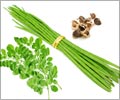According to a recent research, yellow and green vegetables like peas, sweet corn and brocolli have chemicals that may be good for the eyesight
Kids are often told that eating carrots will boost their eyesight, but according to a recent research, yellow and green vegetables like peas , sweet corn and brocolli have chemicals that may be good for the eyesight.
The diets of 1,700 American women of the age group 50 to 79 were studied by researchers at the University of Wisconsin to observe the affect of diet on their chances of developing eye problems. The study was carried out by asking each woman what was her regular diet some 15 years ago.It was reported in the online edition of Daily Mail by the researchers that women under 75 who regularly ate lots of vegetables such as leafy green vegetables, sweet corn, squash, broccoli and peas over 15 years, had less chances of developing Age related Macular Degeneration (AMD).
These vegetables contain carotenoids, which are potent biological antioxidants. Scientists say that this may help in protection against AMD by absorbing blue light that could damage the area at the back of the retina. It also may aid in preventing AMD by strengthening eye membranes and remove the harmful molecules.
AMD affects two million Britons and is the major cause of blindness among people over 50.
AMD occurs when the macula's cells become damaged and cease to work. At present, there is no cure and very limited options to try to slow down its progression.
The study was carried out by conducting blood tests in these women to detect levels of carotenoids - a group of substances that are present in fruits and vegetables giving them the colour - in their current diet.
Advertisement
Lead researcher Dr Suzen Moeller said: "This exploratory observation is consistent with a broad body of evidence from the observational and experimental studies that suggest that these carotenoids may protects against AMD.”
Advertisement
There may be an unidentified nutrient that may aid in preventing AMD.
The scientists reported in the journal Archives of Ophthalmology, that their results could simply be due to chance.
However the scientists, writing in the journal Archives of Ophthalmology also said their results could simply be due to chance.
Thus, a more long-term prospective study and clinical trials should be conducted to confirm their findings.











